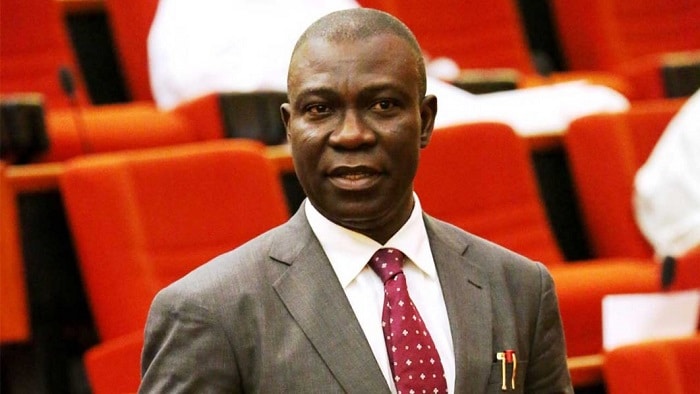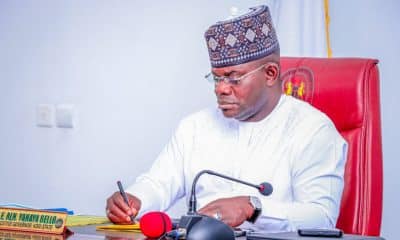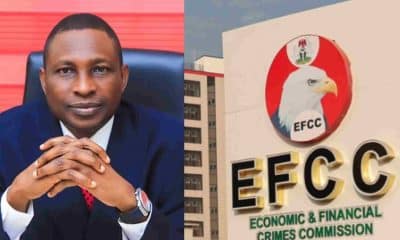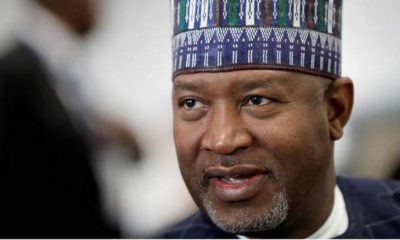Nigeria News
Ekweremadu: As Obasanjo Leaves Example For Buhari Govt

When a government chooses to ignore its obligation, then it shouldn’t mind being asked to learn from a citizen who takes the role upon himself. By his plea to the United Kingdom court for clemency, former President Olusegun Obasanjo carried out diplomacy which the Nigerian state conveniently failed to do for an embattled citizen no less a personage than a serving senator, Ike Ekweremadu, who was a two-term deputy Senate President and holds the national honor of Commander of the Federal Republic (CFR).
Ekweremadu and his wife, Beatrice were arrested last June by the London Metropolitan Police for allegedly trafficking a young Nigerian, David Nwamini, into the UK with the purpose of harvesting his kidney for their ailing daughter. After a six-week trial at the Old Bailey in London, the couple and their doctor, Obinna Obeta, were found culpable of violating the UK’s Modern Slavery Act. The jury found the defendants guilty of taking the 21-year-old street trader in Lagos to London to exploit him for his kidney. Their conviction was the first under the Modern Slavery Act.
There have been calls for the Nigerian government to diplomatically wade into the matter so that the ranking federal lawmaker can at least have a soft landing. Nigeria’s attorney general, Abubakar Malami, while rebuffing such calls in August 2022 said the Nigerian government cannot just intervene because a high-profile personality is involved. According to him, “It has never been the tradition of the Nigerian government to interfere in anything judicial, local or international”. It’s interesting to hear this position when the same Malami interfaced with Saudi authorities when a Nigerian Student, Zainab Aliyu, was incriminated in a drug-related matter in Saudi Arabia.
It calls for wonder why the Buhari government is not forthcoming in seeking clemency for Ekweremadu when the same UK provided diplomatic support and interventions when Mark, the son of erstwhile British Prime Minister, Margaret Thatcher, was accused of plotting with some elements towards effecting a regime change in Equatorial Guinea. An American citizen let alone an official can’t be in Ekweremadu’s current condition without the US government going all out to free them or at the very least providing a defence attorney in the case.
But even without having to pre-judge the matter in those early days of Ekweremadu’s arrest, the federal government could have at least reached out to the British government to demand that they be fair, just, reasonable, and diligent in the conduct of their investigation and the case. The government of President Muhammadu Buhari could have also used such intervention to impress it upon U.K. authorities not to attempt to use Ekweremadu’s case to confirm their stereotyping and racial profiling of Nigerians.
It soon emerged that the Buhari government was not interested in taking this high ground when the eldest son of the former Deputy Senate President, Lloyd Ekweremadu, disclosed that the Economic and Financial Crimes Commission (EFCC) wrote a letter to the London court, urging it to refuse bail to the embattled senator of the Federal Republic. He stated this in a court document filed at the Federal High Court in Abuja to challenge an order obtained by the EFCC for an interim forfeiture of his father’s houses and other assets scattered within and outside the country.
The EFCC was accused of deceit by Justice Inyang Ekwo who pointed out that although EFCC was aware of the current situation of Ekweremadu and his wife in the UK and indeed wrote to the Crown Prosecution Service for information about the lawmaker, it still brought an application seeking an order for the lawmaker to show cause on the assets to be forfeited. In the words of the judge, “I have been asking myself the question repeatedly: How can a citizen of Nigeria who is incarcerated outside the country to the knowledge of the respondent, be expected to show cause in an action in Nigeria brought by the respondent?”
It is within the Buhari government’s playing the Ostrich that Obasanjo’s humanitarian intervention can be better appreciated. In a letter dated April 3, and addressed to The Chief Clerk, the Central Criminal Court, Old Bailey, London, the elder statesman wrote that although Ekweremadu’s action was condemnable and unacceptable, he had contributed his quota to the socio-political development of Nigeria. While pleading for a lesser punishment for the couple for the sake of their sick daughter, Obasanjo described Ekweremadu as “God-fearing, dispassionate, moderate and pan-Nigerian,” who has dedicated himself to “the service of God and humanity and he continues to play visible roles in national development.”
Given that the UK court may be out to prove a point with this test case for the landmark Modern Slavery Act, Obasanjo’s plea for clemency on Ekweremadu’s behalf will be more impactful if coming from the Nigerian government. It’s not too late for the Buhari government to do right by concerned Nigerians even if in the form of good character witness intervention ahead of the Ekweremadus’ sentencing on May 5. The government of the day mustn’t allow its non-interference in the matter to cement the notion that the Nigerian state doesn’t care about people from the tribe that have been described as “a dot in a circle”.
The national healing that is badly needed at this tense moment in our country as well as the President’s legacy will be better served if the Buhari government seizes this moment to ensure that Ekweremadu and his wife get a soft landing. They were only trying to preserve the life of their daughter. While Obasanjo deserves all the accolades for his statesmanship and thoughtfulness, he should go beyond his letter to mobilize other global eminent persons to rally around Ekweremadu who at some point served as the Speaker of the West African parliament.










